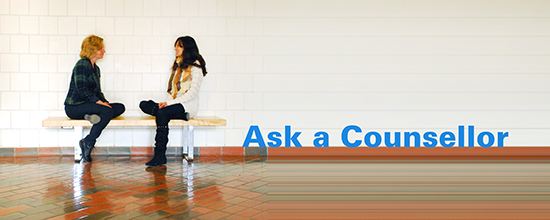
Exam Anxiety
Question: What are some great ways to relieve stress, especially exam stress?
Answer: First, it is worth making a distinction between eustress (beneficial) and distress (a response that interferes with performance). The kind of stress that you might experience in response to exams is helpful when it drives you to take positive actions. If your stress about an exam drives you to study, do practice questions, talk about the material with others, and, even better, teach the material to someone, it is going to be beneficial. Incidentally, understanding how to study the material and being prepared is the best strategy for managing exam anxiety, and MRU’s Student Learning Services supports students in developing their academic skills.
However, I assume you are talking about the unhelpful kind of stress that might lead you to procrastinate, withdraw, experience physical tension and aches, and that can lead to a compromised immune system. This stress often occurs when we sense that the demands we are facing are greater than the resources we need to deal with them. So one option for managing this is to try to shift the balance: are there ways you can reduce demands (e.g., work less during exam time) or are there ways to increase your resources (e.g., increase your study skills or get someone to take over for you on some things)? Doing this with a trusted person might help you to gain perspective that is hard to access when we are stressed.
Once you have tried to restore some balance and feel less overwhelmed, you can look at ways to mitigate the negative effects of stress. You might take mini breaks, go for walks, do something that gives you joy, pet puppies, express gratitude, or spend some time looking at the sky and breathing deeply. Anything that eases body, mind, and spirit fits into this category.
Finally, there are things you can do just prior to an exam and during an exam to relieve the kind of tension that interferes with clear thinking. Creating some quiet for yourself prior to the exam is likely more helpful than trying to scan the text one more time or listening to others talking about what they studied (both can raise anxiety). If you feel shaky, take a moment to tighten the muscles in your fist, arms, and shoulders, hold them for 10 seconds and then suddenly release them (repeat as needed). Breathing into our belly and breathing out slowly tends to have a calming impact. One way to be more resilient in response to increased demands like exams, is to make sure these practices are a regular part of your life.
Check out the SCS workshops that can help you learn to manage stress for the long term. As well, try out the many anti-stress events sponsored by SAMRU, and the various Student Services areas, during exam time.
Regards,
Associate Professor, Registered Psychologist
